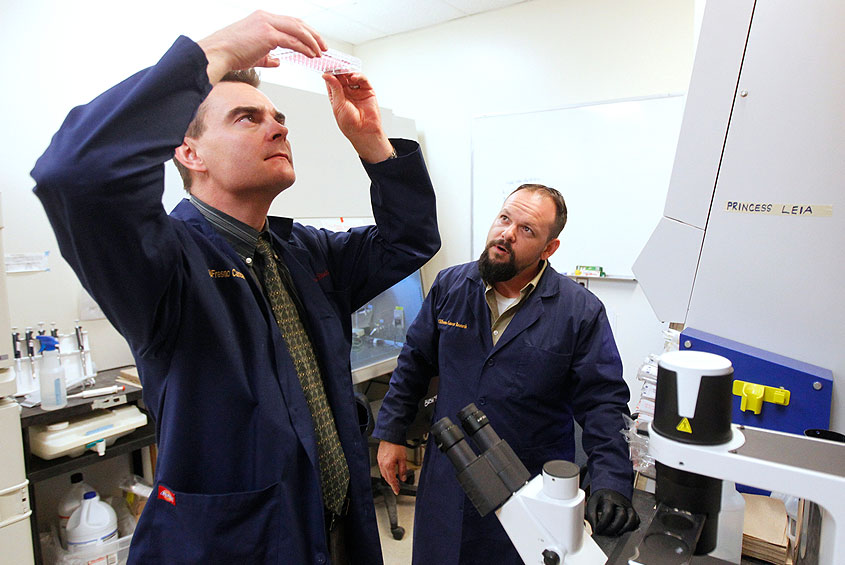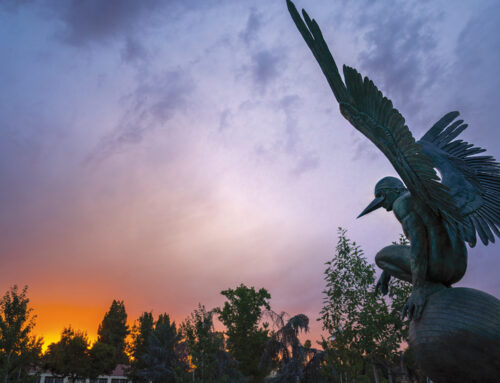Motivated to Find Answers
Biology professor serves on state committee to evaluate chemicals that cause harm
By BoNhia Lee
Dr. Jason Bush’s research lab at Fresno State seeks to understand the early stages of cancer — diving into the science behind the disease which could lead to potential improved treatment down the road.
Bush focuses on breast and pancreatic cancer with the help of undergraduate and graduate students, such as Jennifer Phan, a biochemistry graduate who was featured in the cover story of this issue of Fresno State Magazine. Cancer affects everyone, he says, with 1.7 million people diagnosed in the United States every year and 600,000 people who die from the disease annually. Even in the midst of the coronavirus pandemic, cancer still continues to affect lots of people and the health care system, he says.
“Everybody knows somebody that has cancer,” Bush says. “If it’s not you, it’s going to be a loved one, a family member or a friend. Cancer really does touch everyone and for me that’s motivation — to find answers.”
While Bush transitioned to virtual teaching this past spring, he had to put his lab operations on hold.
“Lab is really challenging since we’ve basically had to suspend all operations,” he says. “Everything is on hold till we can get back into the lab for actual experiments. Students are relegated to some writing and data analysis … it’s understandable but frustrating for the scientific community.”
Bush, a Canada native, joined the Biology Department at Fresno State in 2006. He earned a bachelor’s degree in genetics, a master’s in molecular biology and his doctorate in experimental medicine all from the University of British Columbia.
His doctoral work was in skin cancer and his postdoctoral work at Sanford Burnham Prebys Medical Discovery Institute in San Diego was in cancer biology that branched into breast cancer-related research and large scale approaches to understanding the biochemistry that happens in cancer cells.
Over the years at Fresno State, collaborative opportunities with other organizations and colleagues in the Central Valley — along with support from the California State University system — has allowed Bush to study all kinds of cancers and the causes of those that are statistically elevated in the Valley compared to other parts of California such as thyroid cancer and melanoma.
Carcinogen Identification Committee
Six years ago, Bush was appointed by the governor to serve on the Carcinogen Identification Committee that, under Proposition 65, evaluates data about specific chemicals and makes recommendations on whether they should be included on the master list of chemicals that can cause cancer, birth defects or other reproductive harm.
Prop 65, also known as California’s Safe Drinking Water and Toxic Enforcement Act of 1986, gives people a right to know what they are exposed to. Bush and his counterparts on the committee meet in Sacramento once or twice a year to evaluate a chemical or a set of chemicals usually identified by the Office of Environmental Health Hazard Assessment. The World Health Organization and the Environmental Protection Agency can also submit chemicals for review.
A lot of deep thought goes into this because there are 11 people on the committee, from slightly different science disciplines, offering a rich evaluation from the epidemiological side to the molecular and toxicology side as well, Bush says.
“They really wanted representation from the Central Valley and somehow my name came up,” Bush says. “I was asked by the Office of Environmental Health Hazard Assessment if I wanted to be involved with this and I said, ‘yes, I want to serve, it’s important to me.’ My girls were born in Clovis, and I want to help California.”
Hanging in coffee shops, in the fast food drive-thru lanes and in parking garages across California are signs warning the public about products or exposure to chemicals that are known to cause harm.
“If you know there is something that could be potentially cancer-causing you can choose to modify your behavior. But if you don’t know, then you won’t do anything about it because you just don’t know,” Bush says.
Serving on the committee has proven to have a positive effect on his teaching too.
“For the students, it gives them validation that I’m not some schmuck off the street that [the University] got to teach this course,” Bush says. “That is my passion and my background. They’re getting information from someone who knows what they’re talking about.”
People ask all the time if Bush has found a cure for cancer.
The scientific community has made significant progress, Bush says. Research is key, “trying to delve into the science so that one day we’ll have improved treatment.”






